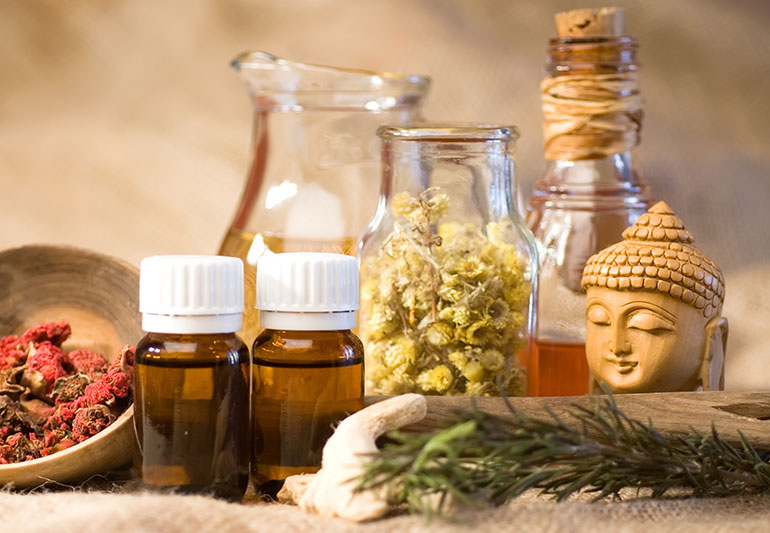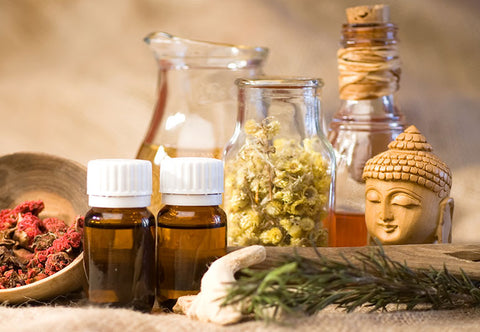
AYURVEDA AND MENTAL HEALTH
Share
Ayurveda defines health as a balance of energy principles (Doshas) and a pleasant state of mind. It is holistic and acknowledges the mind-body-spirit connection. Every Ayurvedic intake includes an assessment of psychological factors, lifestyle, and current stressors. Mental imbalances (Manovikara) are cared for as part of the disease process and aren’t stigmatized.

Our Ayurvedic constitution is composed of three Doshas and their imbalances cause diseases. Vata imbalance typically causes anxiety and phobias, Pitta, anger, and obsessions, and Kapha could cause depression.
Likewise, we all go through phases of feeling uplifted, restless, or lethargic. These are attributes of the mind (Gunas). Sattva is the natural state of the mind that we try to attain for optimal mental health. It is light, productive, and balanced. Rajas is ambitious and restless and Tamas is lethargic and dull. While we need Rajas and Tamas to work or rest, their imbalance can cause anger or depression.
Mental health imbalances are also caused by genetic and external factors, the effect of time, a misuse of our senses or knowingly doing something that harms the health like overeating or engaging in a violent argument! Raising Prana (vital life force) and awareness through practices like meditation helps us to make better lifestyle choices.

Ayurvedic Mental Health Management
Let’s consider simplified examples,
Case 1: Elliot is 15, with an anxiety diagnosis, fear of the dark, disturbed sleep, traveling aches and pains, and allergies. Based on a comprehensive assessment, his case is managed through classical Vata balancing.
Case 2: Astha is a 27-year-old techie with anger issues that have cost her a job. She is ambitious, intellectual, restless, and overindulges in spicy food, drinking, and late nights despite suffering from hyperacidity. In her case, we try to manage Pitta imbalance and reduce Rajas by raising Sattva.
Case 3: Sue is 49 with Type II bipolar disorder. She is very stable but has menopausal mood swings. We make sure she stays on her medication. In a standard assessment, we find issues with Agni, Vata-Pitta imbalance, a tendency to burn out, and attend to impacted channels in an integrative approach.
Classical disease management in psychiatric ailments (Unmada) includes Spiritual Therapy (chants, mantras, and gem therapy), Psycho-behavioral, and Biological Therapies with Palliation (through herbs, nutrition, lifestyle changes) and cleansing.
Ayurvedic Tips to enhance Mental Health
1. Increase Sattva
a. Yoga and breathwork- Harvard Medical School has recommended yoga to deal with Covid-19 anxiety and depression. Read more about the benefits of yoga and yoga poses for better mental health. Here’s a beginner’s guide to breathing exercises and techniques that ease anxiety and panic.
b. Meditation – Meditation rewires your brain. SKY Breath Meditation is a natural mode of Vagus Nerve Stimulation leading to many health benefits. In a recent groundbreaking Yale meditation research, it was found to be more effective than mindfulness or cognitive approaches for well-being, anxiety, depression, and social connections for students.
c. Sattvik food: Have natural, fresh, not overly spiced, easy to digest, light food with plenty of fruits and vegetables. Favor whole grains and lentils and avoid processed, junk food, white sugar, and white flour.
d. Volunteering: Uplifting others and volunteering can reduce stress and help create a support system.
e. Sadvrutta: Positive practices that alter our cognitive frameworks like self-inquiry, patience, a healthy routine, regular exercise, and meditation. These nurture resilience (as also cultivating hobbies, creativity, and gratitude journaling).
2. Preventive health and restoring balance
a. Three pillars – The foundations of good health include a nutritious diet (nutritional psychiatry is the latest buzzword), adequate sleep, and a balanced lifestyle. The Gut-Brain axis is a new frontier in neuroscience acknowledging the link between mental health and gut microbiota. In Ayurveda managing digestive and metabolic fire is the starting point to attain Dosha balance for mental and physical health.
b. Follow a Seasonal and Daily regimen: Align with natural rhythms; fall could be an anxious time with Vata imbalance and winter, with Kapha-related depression. Here are some tips on balancing these Doshas in the winter.
c. Herbs – Consult an Ayurvedic Practitioner before taking herbs. Medhya Rasayana or brain tonics inherently boost immunity and include Brahmi, Amalaki, Ashwagandha, Shankhapushpi, Amruth, Shakti Drops, Kalyanaka Ghrita, Saraswatharishtam, and Chyawanprasha.
d. Cleansing therapies –Try Abhyanga (self-massage), Nasya (oil or herb application in the nostrils), or therapies like Shirodhara (pouring of warm medicated oil on the forehead) and a full Panchakarma (a comprehensive, individualized therapeutic cleanse).
e. Boosting immunity – Boosting immunity through Ayurveda, yoga, and meditation increases mental resilience. Try this yoga sequence for lymphatic drainage (video included).
3. Soothe the senses through pratyahara (sensory withdrawal) and avoid negativity and digital overload. Practice eyecare, color therapy, aromatherapy, try soothing music, tongue-cleaning, oil pulling, and have nourishing food.
4. Nurture relationships – Attend to social health, keep socially connected while distanced. Ayurvedic scholar, Dr. David Frawley, attributes the decline in our collective physical and psychological immunity to losing our connection with nature and the ability to withstand stress. This is also a time to heal our relationship with nature and commit to sustainability.
